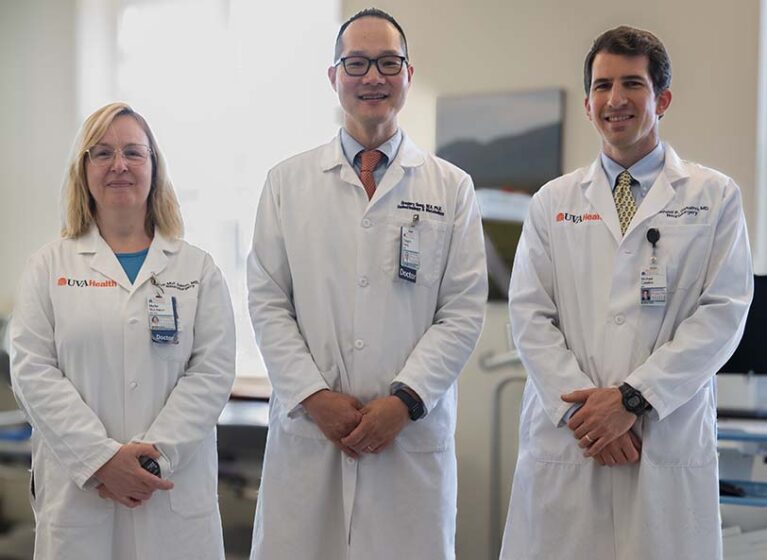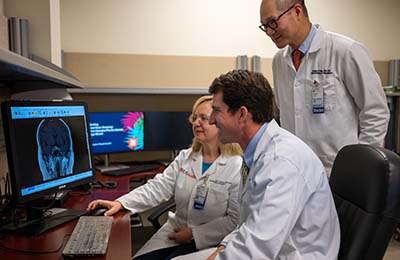
Pituitary tumors are some of the most common intracranial tumors. These complex tumors can cause hormonal problems and vision loss. The strengths of the UVA Health Pituitary Tumor Program have been displayed through decades of optimizing outcomes for both hormone-producing pituitary tumors and the most invasive pituitary tumors. This has been accomplished not only by developing cutting-edge techniques but also streamlined, efficient, multidisciplinary care pathways.
The program oversees the care of roughly 11,300 patients with pituitary tumors, including pituitary adenomas, craniopharyngiomas, acromegaly, and prolactinomas, as well as patients with Cushing's disease. The team provides this care through expert collaboration, advanced surgical and radiosurgical techniques, and a history of moving the field forward.
“The patients we treat with highly invasive pituitary tumors underscores the core strengths of our approach — and its effectiveness,” says pituitary neurosurgeon Michael Catalino, MD. “We have the perspective to be patient when we need to be patient, but also timely and comprehensive in order to ensure patients receive the best upfront treatment plan for those who need it. We strive to get patients in quickly, be thorough in our explanations, and provide both treatment and long-term surveillance. It’s about balancing perspective with availability and comprehensiveness.”
It Takes a Village to Provide Optimal Care for Pituitary Tumor Patients
The team has expertise across every field, including radiology, radiation oncology, neuro-endocrinology, neuro-ophthalmology, rhinology, neuropathology, and neurosurgery.
"The multidisciplinary approach to managing pituitary tumors means taking something that looks impossible, such as complicated hormonal problem, or a tumor that invades the cavernous sinus, and figuring out what role each of us can play in developing a solution. “It’s saying, ‘How can we best work together to help this patient?" Catalino explains.
He adds: “Through our dedication to innovation, collaboration, and efficiency, we’ve been able to offer the best combination of approaches. Our goal is always to preserve or restore normal pituitary function and achieve lifelong remission through hormonal therapy, safe surgical removal using the most innovative surgical techniques, and adjuvant Gamma Knife radiosurgery for select patients with the most challenging tumors, reaffirming our position as leaders in pituitary tumor management.”
UVA Health neurosurgeon Jason Sheehan, MD, is a world expert in combining Gamma Knife with precision surgery to provide lifelong tumor remission. He’s served as the principal investigator on numerous high-impact studies — including one published in April in the journal Neuro-Oncology. The multi-center study assessed radiosurgery’s effects on stopping tumor growth in non-functioning pituitary adenomas.
Another study published in March in the Journal of Neurosurgery recounted the long-term radiographic and endocrinological outcomes of stereotactic radiosurgery for recurrent or residual non-functioning pituitary adenomas.
“We have a prominent pituitary program, both nationally and internationally,” Sheehan says. “But it’s because treating these tumors often requires multiple specialists to really provide optimal care. It takes a village.”
Additionally, Melike Mut Askun, MD, PhD, makes significant contributions to the advancement of pituitary tumor management. Her guiding principle is to achieve maximum safe resection of tumors while preserving function. Her approach to safe resection is crucial for all brain tumor patients, reflecting her dedication to patient care and her compassion for their well-being. She is dedicated to quality of life in pituitary patients.
“The pituitary gland is responsible for hormonal balance in the body, and disruption of hormonal balance in patients with pituitary adenoma indirectly affects the quality of life,” she says. One of her notable studies, published in the European Journal of Endocrinology, examined the effects of combined aerobic-strength training and yoga on the quality of life in women with pituitary adenomas after surgery. The randomized crossover study found that both exercise interventions had positive effects on quality of life, cognitive function, and anxiety levels.
Mut Askun specializes in the care of pituitary patients as well as conducts extensive benchside research to uncover the molecular mechanisms of tumors for possible future translational studies. Dr. Askun’s research encompasses genetic mechanisms, molecular diagnostics for detection and monitoring of pituitary adenomas and AI imaging of pituitary lesions. One example is coauthoring a study for describing a novel PRKAR1A mutation on Carney Complex and its varied clinical presentations, including pituitary adenomas and other endocrine abnormalities. She is part of a group working to develop noninvasive serum diagnostic tools for early diagnosis and monitoring of pituitary adenomas.
She is also actively engaged in the challenging field of artificial intelligence (AI) imaging of pituitary lesions, signifying pioneering advancements in diagnostic and treatment processes. Her expertise and innovative research are paving the way for improved outcomes in neurosurgery and reinforcing the multidisciplinary strength of the program. “Our strength is teamwork and each day we are trying our best to improve our patients’ lives.” Through her dedication to innovation, collaboration, and efficiency, Mut Askun exemplifies the commitment to advancing pituitary tumor management at UVA Health, ensuring patients receive the best care possible.
A Partner in Pituitary Disease Care
"We’re known for long-term patient follow-up at UVA Health," Catalino says. Which is especially important with pituitary tumors, which can recur after even after 20 years or more. We are committed, for as long as it takes to make sure they continue to live a full life.
“We often are patients’ primary caregiver for this specific health problem, helping provide lifelong management of the entire disease,” he says.
That doesn’t mean that once patients come to UVA Health, they leave the care of their local doctor, though.
“If I get a referral for a patient and I find the imaging potentially concerning, I immediately pick up the phone and call the patient or referring physician,” Catalino says, adding that the team is also in constant contact with the referring doctor. “I tell the provider that we’ll bring the patient here and do what we can to help them, but, ultimately, we’re going to send them back. We want to help patients as best we can, but we also want to help empower their local care team.”
Expertise Lends Perspective to Disease Treatment
The perspective UVA Health providers in the pituitary program bring to tumor management is vital, Catalino says, recounting the recent treatment of a patient with Cushing’s disease who experienced tumor regrowth in the cavernous sinus.
“The surgery went well, the MRI looked clean, and the patient went into remission, but from our research on recurrence rates in corticotroph adenomas, the subtype of pituitary tumor that causes Cushing disease, we knew her risk of recurrence was high and Gamma Knife radiosurgery would be necessary to optimize the long-term outcome,” he says.
Sheehan notes that Gamma Knife gives patients with challenging pituitary tumors a path forward: “We still have lots of good options even after initial first- and second-line treatments are used for these patients.”
Neuro-endocrinologist Gregory Hong, MD, works with Catalino, Mut Askun, and Sheehan to ensure patients have normal hormone levels after surgical or radiation treatment to either preserve or improve their health. He points to the team’s long history of sustained excellence in pituitary tumor treatment for their positive patient outcomes. “We have our own data, so we know our past outcomes; we know the likelihood of success and, as such, we can counsel patients more appropriately and give them realistic and good advice on what optimal therapy will look like for them.”
Hong adds: “We’ve also always been early adopters of new medical therapies that come out. We’re very willing to try new drugs as they become available if we think they’ll benefit our patients.”
Patients with pituitary tumors come from all over the country to receive care at UVA Health, Sheehan says. “We’re moving the field forward on all fronts — medical, surgical, and radiosurgery.”
Pioneers in Multidisciplinary Care & Treatment Techniques
UVA Health endocrinologist Mary Lee Vance, MD, founded the program 1992 along with two other physicians.
“Then and now, at most programs, the patient sees an endocrinologist one day, then a neurosurgeon another day or at a different location,” Vance says. “We wanted to give patients and their families a total view of what the patient has and what needs to be done from both the endocrine and the surgical standpoints — all on the same day.”
Since its start over 30 years ago, the program’s specialists have provided same-day, multidisciplinary care — and pioneered techniques for managing pituitary disease. Endocrinologists have led the development of all existing medical treatments and the refinement of replacement therapy for pituitary deficiency, for example.
And neurosurgeons have led the way in using endoscopic endonasal surgery for pituitary tumor treatment, recently expanding this capability to treat the most invasive tumors affecting the brain and base of the skull. This refined approach aims to preserve, or even improve, pituitary function, nasal health, and vision, while providing the best up-front combination of treatments for the tumor. In particular, for young men and women desiring families, we do everything we can to consider fertility preserving approaches.
Enhanced Recovery After Surgery Protocols for Pituitary Disease
Currently, Catalino has been working with UVA Health team members to deploy an Enhanced Recovery After Surgery (ERAS) protocol for pituitary disease, It's a formalized version of the protocol used for decades at UVA Health. The goal is to optimize the recovery process by reducing variability when appropriate and to allow us to focus on the unique aspects of the disease for each patient, Catalino says.
“The idea is to take something that’s really complicated and make it simpler for the patient,” he says. “It’s all part of our singular focus on improving the lives of patients with pituitary tumors. Every single day, this is what we’re thinking about.”
